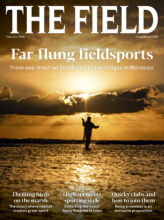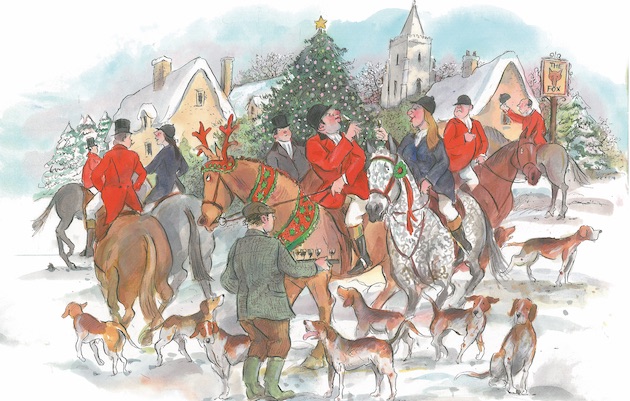The Christmas box is more than just a gift, which is why everyone should give as generously as they can this festive season – or risk going down in hunting history for all the wrong reasons
Rory Knight Bruce lays out the dos and don’ts of the Christmas box as we show our gratitude to hunt staff for a year of hard work.
Who is the real Father Christmas? Folklore, religion and revelry have combined over the centuries to create the festive figure so central to our celebrations today, writes Ettie Neil-Gallacher
Being inventive with the leftovers is the best part of the festive feast, says Philippa Davis, as she shares her favourite Christmas leftovers recipes.
THE PERFECT CHRISTMAS BOX FOR HUNT STAFF
It is Twelve Days before Christmas but in hunt kennels across the land all is far from crisp and even – and the only thing that is deep is the muck heap.
The Master has sprung some extra days, the prettier grooms have gone missing and the second whip has put his name on the transfer list. Welcome to the festive fun for hunt staff.Of course, it is not all bleak midwinter. There is a cocoon of good cheer that envelops the countryside from the beginning of December and hunting sits at the very heart of this.
It is not about shopping but the thought of seeing a dash of scarlet on a hillside of lightly dusted snow. Many hunts host their own carol services and these provide yet another opportunity to raise a glass to better times ahead.Such sights and joys, however, do not simply come down the chimney. For hunt staff, it is the busiest time of the year. Even when, as is the case this year, there is a Sunday break between hunting on Christmas Eve and the Monday of Boxing Day, there is still plenty of work to be done between the crackers and plum pudding. So, how do hunt staff prepare for this crammed calendar of the chase and how should we show our gratitude to them?
A DAY WITH THE PORN
I know of one subscriber who would go to the kennels and give a copy and year’s subscription to Penthouse magazine with the instruction: “To be shared amongst you.” This may now be deemed out of date and inappropriate. Other no doubt well-meaning gift bearers choose to turn up to the huntsman’s door on Christmas morning. This will be the one time of the year when he is not pleased to see you, worrying instead about how he is going to cram in all his work around the turkey and cranberry sauce.
ST STEPHEN’S DAY
First, however, it is necessary to understand what ‘Boxing Day’ means, both in hunting and the wider community of the countryside. Only then can we judge what our contribution to the hunt staff should be. In Ireland, of course, the Boxing Day meet is known as St Stephen’s Day, it being the birthdate and feast day of this patron saint. Both there and in mainland Britain, it has been, since the Middle Ages, a time to give alms to the poor and recognise those who work ‘in service’ (so hunt service would qualify) and those who help (but are not directly employed by) the donor of a gift (so, again, hunt staff would qualify).
The Oxford English Dictionary gives the earliest mention of Boxing Day in the 1830s, defining it as: ‘the first weekday after Christmas Day, observed as a holiday on which postmen, errand boys, and servants of various kinds expect to receive a Christmas box’. The term ‘Christmas box’ itself dates back to the 17th century and among other things meant: ‘A present or gratuity given at Christmas usually confined to those who are supposed to have a vague claim upon the donor for services rendered to him.’
Today, the gift of a pourboire might include, among others, one to the gamekeeper, postman, dustman, regular window cleaner, daily, gardener, butler or occasional farm help, as well as being presented to hunt staff. There is nothing ‘Downton Abbey’ about this, although I myself, up until the 1980s, used to dread my father’s instructions to take a brace of pheasants to the cottage tenants just before Christmas when they would, I am sure, have preferred something a little less patrician.
The Oxford English Dictionary also explains that, in Britain, it has been an age-old custom for tradesmen to collect ‘Christmas boxes’ of money or presents on the first weekday after Christmas as thanks for good service throughout the year. This is mentioned in that great diarist Samuel Pepys’ entry for 19 December 1663. ‘Thence by coach to my shoemaker’s and paid all there and gave something to the boys’ box against Christmas.’ This is linked to an even older British tradition where the servants of the wealthy were allowed the next day to visit their families. They would be sent off with a box containing gifts, bonuses and sometimes leftover food. Today, likely as not, it is the custom to give gifts before Christmas and few are the families who would welcome cold festive scraps from the Big House when they are still puzzling out yet another recipe for their own ham and turkey leftovers.
Which brings us to the tips or Christmas box itself. In one or two stories of hunting and shooting the gift has been a life-changer. On his retirement, jockey Jimmy Lindley picked up out shooting for Grand National and Derby-winning owner Jim Joel. “I know I promised you my pair of Purdeys in my will,” Joel said to Lindley after a festive day’s shooting. “I tell you what. Have them now so you won’t have to wait.” And a West Country professional huntsman I know opened his Christmas card to find that his two children were to be given paid places at the local independent school.
LACOCK LARGESSE
One of the great spectacles of the Christmas calendar is when the Avon Vale foxhounds parade through the ancient high street of Lacock in Wiltshire. It regularly attracts a crowd of 4,000 to 5,000. Major Jonathon Seed, for many years the Avon Vale’s Surteesian Master and huntsman, explains: “The day would raise several thousand pounds for the hunt staff. The gratuities distribution was written into their contracts and they would receive this money in its entirety as part of their earnings. It is a reward to hunt staff only for a great deal of hard work by a valued team.”
Seed’s preparations for Boxing Day, and those of his wife and Joint Master, Lesley, should serve as a thoughtful template for all hunts. “We always had the Christmas Eve meet at the kennels,” he remembers. “I would get the hunt staff to provide some bottles of port after hunting and then get them to invite the followers back for a drink. In this way, it was an opportunity for the followers to give their ‘Christmas box’ to the staff there and then.”
But what about Christmas Day itself? “Lesley and I would go and ride the hunt horses out or muck out and then have the staff to our home for Christmas lunchtime drinks. In this way, all they had to do was get the horses ready for the next day and they had the afternoon free to be with their families.”
Not all Masters are as thoughtful or generous with their time and organisation. One professional huntsman recalls his Master giving him a fiver. “I chased after him and gave it back to him with the words: ‘I think you need this more than me, sir.’” Without a hint of shame, the Master replied: “Thank you.” Mercifully, his Joint Master, more au fait with good etiquette, gave the huntsman a very large present. A keeper of my acquaintance was similarly tipped a fiver after a day’s shooting. When he presented the given brace of pheasants to the ungrateful Gun, the fiver was deftly placed in the cock bird – and it wasn’t in his beak.
I do not think that any visiting Master (or hunting or shooting guest, for that matter) should think of parting with less than £50 to the professional huntsman or keeper for even a modest day’s sport. Another professional huntsman told me of an unusual way of thanking people for their Christmas box. “I would thank the ones who gave me something and then thank the ones who didn’t,” he told me. “This, more often than not, would embarrass the non-givers into making amends.”
Patrick Martin, hunt staff liaison officer for the Masters’ of Foxhounds Association, puts the importance of the Christmas box into perspective. “It makes such a difference when hunt members and supporters remember their staff at Christmas. It shows that all their skilled and hard work, long hours with horses and hounds, are noticed and appreciated.”
What do I remember about receiving festive generosity in my three masterships? At the United Pack on the Welsh Borders, hill farmer Jack Morris would bring me illicit home-cured pork scratchings, never bettered by commercial rivals. At the Tedworth, I was given the silver presentation hunting horn of a former Master by a grateful descendent. In Devon, at the Torrington Farmers’, the late Rolling Stones drummer Charlie Watts – who, with his wife, Shirley, owned the Halsdon Arabians stud near Dolton – would have me to lunch and give me a generous envelope. “This is for the horses, not for the hounds,” a note read one year.
STORY TELLING
One of the great wonders of hunting is its oral history, stories that are handed down like the Apocrypha, retold again in bars and by warming winter firesides. This often involves ‘the doings’ of hunt staff. One story of great hilarity, concerning the opening of Christmas cards and gratuities, has been told to me by a very senior former professional huntsman. He would gather his team on Boxing Day evening, light the fire and draw down a bottle of whisky. Out came the envelopes from the great and good, some with fulsome thanks and generosity, others with only a meagre tenner fluttering from the card, or a Coutts cheque for the same amount. “We would then throw the cards onto the fire,” the huntsman recalls. “By the end of the evening, we didn’t even care if the tenner or the meagre cheque went on the fire as well.”
So it is well to remember that hunt staff have their say as well, which often passes into folklore. Several professional staff have told me how they have appreciated a Christmas cake with a scene of a fox and hounds lovingly decorating the top. Others have mentioned being given a precious whip, a hip flask, a hand-made cuddly toy of a fox in a scarlet coat (complete with miniature engraved hunt buttons). To be appreciated is all they ask. To avoid any doubt and their censure, and earn their eternal appreciation, surely the watchword at Christmas and on Boxing Day is: ‘To give as generously as you can.’





